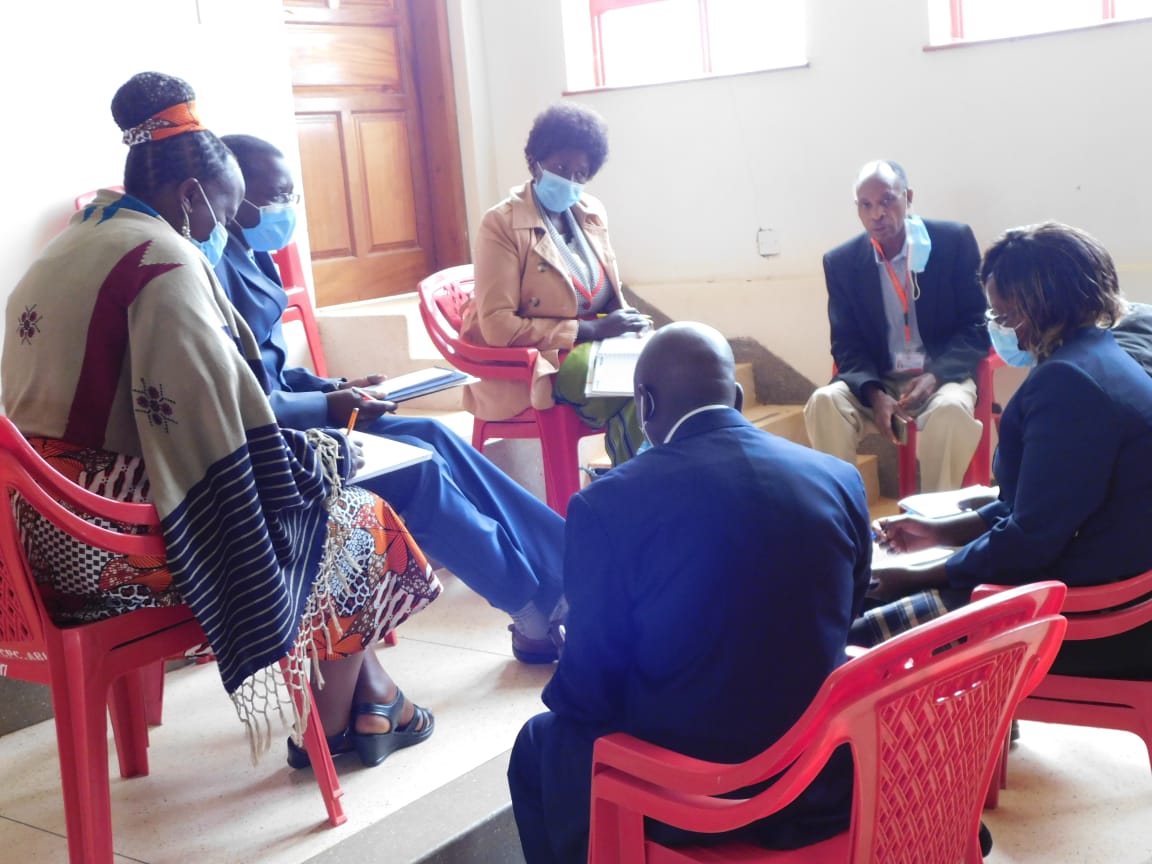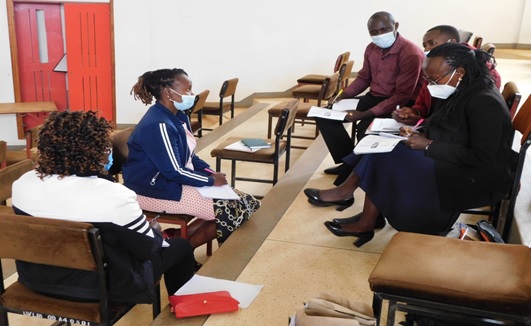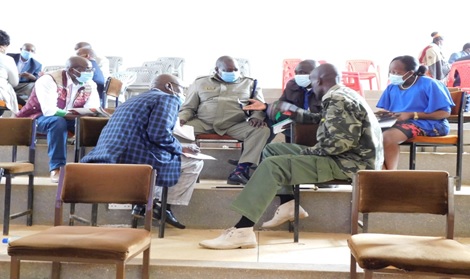The Laikipia University Stakeholders Forum is organised biannually by the Directorate of Research, Human Rights and Gender. The University identifies potential partners from various sectors in the society and invites them to the forum. The forum provides the stakeholders an opportunity to interact, dialogue and chart the way forward towards an effective partnership with the university on matters of interest to the society.

A group photo of the participants of the Laikipia University Stakeholders' Forum June 2021
The Acting Deputy Vice-Chancellor (Academic and Research) introduced the Vice-Chancellor, Prof. Joseph Kibett (PhD) and welcomed him to address the participants and officially open the forum.
In his key address, the Vice-Chancellor underscored the importance of Stakeholders in providing feedback, sharing ideas; assist the university with information on practical aspects of responding to the needs of the community. The University also looks forward to practical ways of enhancing future collaborations. He stressed the role of the University in drawing together experience and facilitating positive engagement among the different stakeholders. He concluded with the official opening of the forum.
PLENARY DISCUSSION

Vice-Chancellor, Laikipia University and Deputy Vice-Chancellor (Academic, Research & Student Affairs) closely follow the proceedings during the Forum
Thematic Issues
The following issues were presented for discussion:
- Agriculture and environmental sustainability
- Education and research
- Gender and Human Rights
- Security
- Health
EXPECTATIONS
a) University’s Expectations
- That the stakeholders will give suggestions that can be incorporated by the University in preparing academic programmes.
- That there should be mutual trust between the society and the University where the society is expected to do a periodic social audit of the university e.g. impact assessment of the university’s graduates.
- That partnerships will be developed to promote technological interventions in areas of health, security, agriculture, renewable energy and environmental sustainability.
- Develop partnerships that would utilise skills in the university as a tool for value addition to society.
- Enhance technologies that can tap solar energy for irrigation and other household usages.
b) External Stakeholders’ Expectations
- That the university absorbs skills attained from the local vocational training centres and polytechnics.
- That the University provides pathways for further education for graduates from vocational training centres and polytechnics.
- That the university to prepare short programmes for capacity building staff in various institutions represented
- Develop partnerships with county ICT centres to patent innovations
- Enhance technology that will enhance access to justice/research on appropriate technologies to assist in dispensing justice in courts of law.
- Work closely with security agents such as National Crime Research Centre, Police Service and Prison Service to support and protect the right to life and education.
- Work with local security agents to capacity build and strengthen community policing
- Work closely with civil society and other agents that support the right to health, housing and social protection.
- Nurture innovations by developing policies with the relevant partners (eg. KNCHR) to nurture, patent and protect copyright laws. The university to work closely with local communities to support talents e.g. how to promote products from prisons service
- Conduct research to provide authentic data to add value to the national conversation on mental health.
- Identify key potential industries that make use of consultancy services of the university
- Enhance health awareness campaigns in collaboration with private, public, NGOs and international partners.
- Create awareness to the community on the services within the university (what the university can offer to the society)
- The University to create partnerships that can develop social innovations (eg. one that can remind a patient about appointments and time for taking medicines)
- Research gender-based/domestic violence, drug trafficking, substance abuse and alcoholism and use the data to suggest solutions.
C) SPECIFIC AREAS SUGGESTED FOR RESEARCH, TRAINING, CAPACITY BUILDING & COMMUNITY OUTREACH PROGRAMMES

Participants Sharing ideas on Agriculture and Environmental Sustainability
A. Health Sector
- Mental Health
- Inequality in access to health care
- Innovations around mental health (apps on medication)
- Defining mental health
- Incorporating technologies in mental health
- Nutrition
- Teenage pregnancies
- Impact assessment on volunteers on community health workers
- Impact of medical camps on community outreach
- Cancer of the digestive system which is prevalent in Nyandarua County
Capacity Building
- Health workers on financial management
- Addiction to drugs, alcoholism sex and social media
- Community-based rehabilitation centres
- Community Health volunteers
- Social medial as a platform to drive the agenda of mental health
Community Outreach
- Hand hygiene, Sanitation and Prevention of Communicable diseases
- Creating Awareness on Mental Health and managing mental Health
- Community Screening
- Targeted Community Outreach on Arthritis, old age prostate cancer and cancer of the digestive system
Health Sector Expectations from Laikipia University

Health Sector stakeholders sharing their ideas during group discussions
- Construction of a library
- Technical Advisory Board in the County
- Teenage Mentorship
- Research groups
- Publications
- Advisory on Health Policies
- Capacity Building of Health Promotion Officer/workforce on preventive promotion Health.
B. Security Sector Expectation

Security Administrators sharing their Contributions
i) Training
To engage the community and university fraternity by organizing training sessions sponsored by the institution and give chance to both external security agents and internal officers to educate, sensitize and interact with the parties on matters pertaining to security. This is deemed to create togetherness and all the participants shall feel honoured by the institution to become part and parcel of the same and feel free to assist in curbing security threats into the university through volunteering information to the relevant authorities. e.g the police and university management.
ii) Researching on Drugs Trafficking
The institution to research drug trafficking mostly by youths; the outcome of which shall direct the concerned parties towards fighting the menace.
iii) Political Instability
The university should contribute to the national conversation on the reduction of political violence by forming pressure groups to mobilize and bring together the political class, students, staff, the community and security agents. An M.O.U should be signed to formalise this collaboration. This, it is expected will go a long to tame political violence insecurity within the institution and in the surrounding community.
iv) Students Unrest
Having been realized that whatever student’s unrest emerges there is definitely a clash between students, the community and the security agents. This, being a long-term problem, there is need for the institution to explore and come up with a method that can assist to bring these parties together and see how best possible to eradicate the ugly situations that are witnessed every now and then.
C. Agriculture and Environmental Sustainability
- Develop technological innovations (smart technologies) to monitor emerging issues in farming (pest/disease control and changing weather patterns).
- Mount short courses on farmers' training and other adult education programmes.
- University to conduct research on effects of raw effluent released from residential areas into rivers in Nyahururu town.
- Conduct research on the possibilities of re-using waste water to manufacture fertilizer.
- Develop modern techniques for detecting water for drilling.
D. Gender and Human Rights
- It was suggested that the Directorate should follow up on the roll-out of the certificate course in Economics, Social & Cultural Rights which already has a teaching manual in place that was done by the Kenya National Human Rights Commission (KNHCR) in collaboration with lecturers from Laikipia University.
- The Directorate could engage in community outreaches and collaborations with Laikipia and Nyandarua Counties where they could train county staff on Gender and Human Rights matters
- Develop a certificate course in Gender, Gender-Based Violence Management, Conflict Management and Resolution.
- The University could look into how they could partner with the local administration i.e. the chief in creating awareness to the surrounding community on Gender-Based Violence Management, Conflict Management and Resolution
- Conduct Baseline Survey on Drug and Substance Abuse in Laikipia County and Nyandarua County and conduct community sensitizations on Drug and Substance Abuse.
- Conduct research on the Intersex and be a pioneer in developing policies and inclusion structures on the Intersex
Closing Remarks
From the side of Laikipia University, the forum with the stakeholders was a valuable opportunity to foster relations and engagement with the community. Dr. Raphael Kiugu concluded the meeting by appreciating everyone for making the meeting possible, singling out staff in the Directorate of Research, Human Rights and Gender for successfully organizing the forum. He thanked the stakeholders for attending and participating effectively and also demonstrating interest for future engagement.
